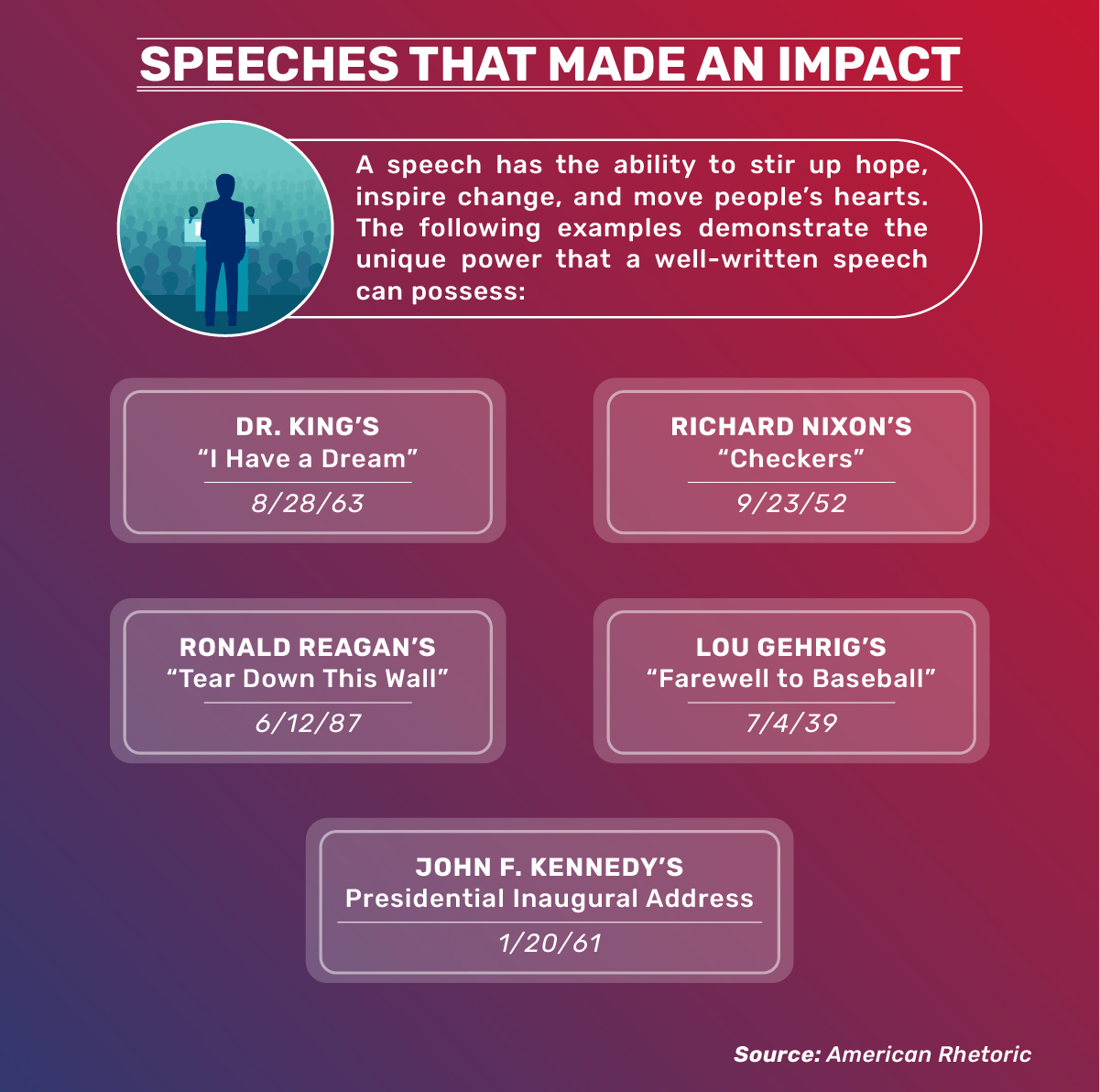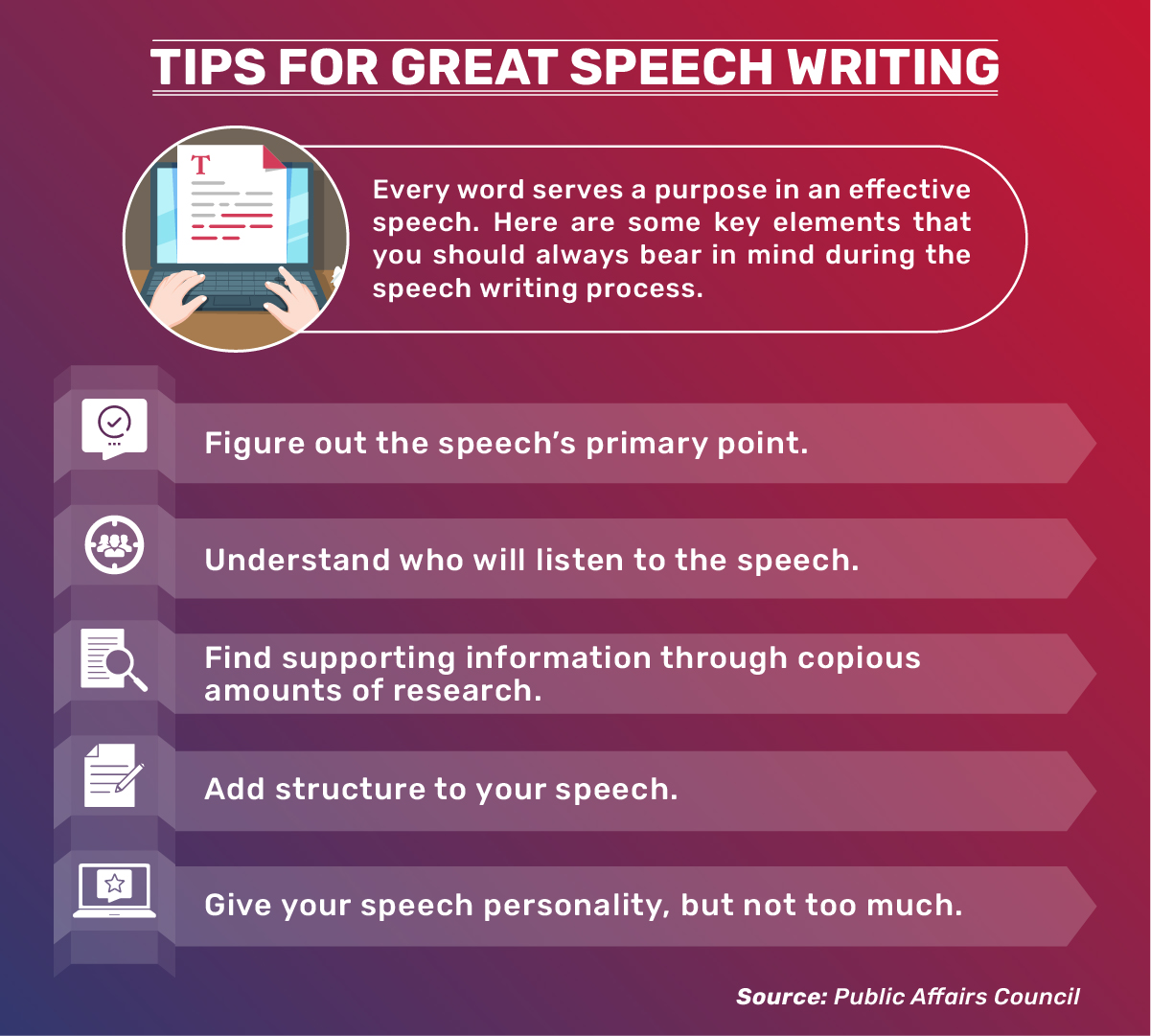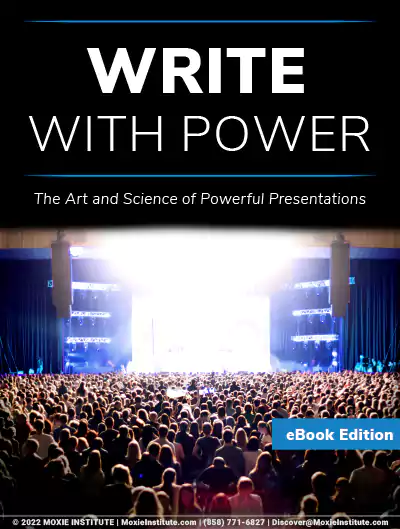DPI-835M: Speechwriting
In this section.
- Courses related to climate
- Course Registration
- Courses related to racism & bias
- Cross-Registration & Auditing


Stephen Krupin

MaryRose Mazzola
What makes a speech persuasive and memorable – and how do you write one? How can storytelling help political, corporate, nonprofit, and community leaders achieve their goals? What is the role of the speech in our politics, policymaking, and international relations? This course will explore the techniques speechwriters and speakers use, from research to rhetoric, to shape messages that move people and change the world.
Every Communications Program course assumes a fluency with the English language. Attendance at first class required.
Your browser do not have javascript enabled. Without it the site has limited functionality.
The Art of Speechwriting
Archived Course
Facilitated e-learning
11 November 2019
United Nations Institute for Training and Research ( UN Partner )

Course details
This course gives you the essential principles of the art and craft of speechwriting.
Throughout history, the speech has been one of the most powerful forms of communication. Technological, social and economic changes have enhanced that power. As digital communication has increased, speeches have had to become more authentic and honest. This course gives you the essential principles of the art and craft of speechwriting. After first defining why speeches matter, the course looks at the three golden principles of speechwriting, before moving on to how to make the content memorable and engaging. It then focuses on honing the participants writing and editing skills with specific exercises on hooking your audience and crafting media sound bites and quotes. Finally, it examines how to deliver a speech with confidence and conviction.
Target Audience
The course targets mid to senior-level government officers in ministries preparing for and/or taking part in conferences in relation to climate change as well as staff of intergovernmental / nongovernmental organizations. It also targets entry-level and mid-career diplomats working in a multilateral setting. Private sector specialists and students whose work or studies are related to this subject are also encouraged to apply.
Learning Objectives
- Identify the elements of a good speech as well as the 3 golden principles;
- Apply principles of effective writing;
- Manage the audience's attention span throughout the speech;
- Get your message across to the media and on social media;
- Understand the principles of effective delivery and recognise the importance of non-verbal communication.

La dimension de genre du désarmement
Self-paced e-learning
Offered by:
SDG: SDG 5 , SDG 16

Je connais le genre 1-2-3

Human Rights, Human Wrongs
SDG Academy
SDG: Leave no one behind , SDG 5 , SDG 16

SDG Cases - Flying High
Comiteau, L., Nikolopoulou, K., van Tulder, R.
RSM Erasmus
SDG: SDG 5 , SDG 8

Gender in Fisheries
Open Learning Campus
SDG: SDG 5 , SDG 14

Typical food products and geographical indications for sustainable development
Microlearning
Nuria Ackerman (United Nations Industrial Development Organization) , Ebe Muschialli (United Nations Industrial Development Organization) , Fabio Russo (United Nations Industrial Development Organization)
SDG: SDG 5 , SDG 8 , SDG 9
Rhetoric: The Art of Persuasive Writing and Public Speaking
Gain critical communication skills.
This Harvard online course introduces learners to the art of persuasive writing and speaking and teaches how to construct and defend compelling arguments.

What You'll Learn
We are living in a contentious time in history. Fundamental disagreements on critical political issues make it essential to learn how to make an argument and analyze the arguments of others. This ability will help you engage in civil discourse and make effective changes in society. Even outside the political sphere, conveying a convincing message can benefit you throughout your personal, public, and professional lives.
We will be using selected addresses from prominent twentieth-century Americans—including Martin Luther King Jr., John F. Kennedy, Margaret Chase Smith, Ronald Reagan, and more—to explore and analyze rhetorical structure and style. Through this analysis, you will learn how speakers and writers persuade an audience to adopt their point of view.
Built around Harvard Professor James Engell’s on-campus course, “Elements of Rhetoric,” this course will help you analyze and apply rhetorical structure and style, appreciate the relevance of persuasive communication in your own life, and understand how to persuade and recognize when someone is trying to persuade you. You will be inspired to share your viewpoint and discover the most powerful ways to convince others to champion your cause. Join us to find your voice!
The course will be delivered via edX and connect learners around the world. By the end of the course, participants will be able to:
- When and how to employ a variety of rhetorical devices in writing and speaking
- How to differentiate between argument and rhetorical technique
- How to write a persuasive opinion editorial and short speech
- How to evaluate the strength of an argument
- How to identify logical fallacies in arguments
Course Outline
- Define the term "rhetoric."
- Articulate the importance of effective communication
- Summarize the history of rhetorical study, from the ancient Greeks to the modern-day
- Identify the parts of discourse
- Define the three modes of appeal
- Identify tropes and schemes, and explain their use in composition
- Compose an opinion editorial on a topic of your choice
- Analyze Martin Luther King, Jr.’s “I Have a Dream…” speech
- Define inductive reasoning and some of its associated topics
- Identify instances of inductive reasoning in writing and speech
- Define deductive reasoning and some of its associated topics
- Identify instances of deductive reasoning in writing and speech
- Recognize and evaluate the strength of an argument's refutation
- Apply the elements of rhetoric you have learned so far into the final draft of your op-ed
- Analyze Sarah Brady’s Democratic National Convention Keynote Speech
- Analyze Charlton Heston’s speech on the Second Amendment
- Define “inductive reasoning” and some of its associated topics
- Define “deductive reasoning” and some of its associated topics
- Recognize and evaluate the strength of an argument’s refutation
- Apply the elements of rhetoric you have learned so far in the final draft of your op-ed
- Describe the origins of the practice of oratory
- Recognize ways in which orators tailor their writing for the spoken word
- Describe techniques for effective public speaking, both prepared and extemporaneous
- Brainstorm ideas for your own short speech
- Analyze Joseph McCarthy’s “Enemies Within” speech
- Analyze Margaret Chase Smith’s "A Declaration of Conscience" speech
- Identify the modes of appeal and the logical reasoning of the featured speeches
- Identify both common and special topics used in these speeches, like cause and effect, testimony, justice and injustice, and comparison, and begin to recognize their use in other speeches
- Identify examples from these speeches of logical fallacies including the either/or fallacy, the fallacy of affirming the consequent, the argument ad hominem, the argument ad populum, begging the question, the complex question, and the use of imprecise language
- Discuss the importance of winning and keeping an audience’s trust and the pros and cons of attempting to tear down their confidence in an opponent
- Define for yourself the definition of "extremist rhetoric," debate its use as a political tool
- Consider the moral responsibilities of those who would seek to persuade others through language
- Discuss how the audience and the desired tone for a speech can influence diction (word choice)
- Compare the effects of using passive vs. active voice, and first-person vs. other tenses in a speech
- Discuss the effectiveness of the use of symbolism in writing and speech
- Define hyperbole, antimetabole, and polysyndeton, and identify when these devices might be appropriate and useful in terms of persuasion
- Describe techniques for connecting with your audience, including storytelling and drawing on shared experience
Your Instructor
James Engell is Gurney Professor of English and Professor of Comparative Literature, also a member of the Committee on the Study of Religion, and a faculty associate of the Harvard University Center for the Environment. He has also directed dissertations in American Studies, as well as Romance Languages & Literatures (French).
Education: B.A. 1973, Ph.D. 1978 Harvard
Interests: Romantic, Eighteenth-Century, and Restoration British Literature; Comparative Romanticism; Criticism and Critical Theory; Rhetoric; Environmental Studies; History and Economics of Higher Education
Selected Works: The Call of Classical Literature in the Romantic Age (2017, ed. with K. P. Van Anglen) and contributor, "The Other Classic: Hebrew Shapes British and American Literature and Culture." William Wordsworth's Prelude (1805), edited from the manuscripts and fully illustrated in color (2016, ed. with Michael D. Raymond). Environment: An Interdisciplinary Anthology (2008, ed. with Adelson, Ranalli, and Van Anglen). Saving Higher Education in the Age of Money (2005, with Anthony Dangerfield). The Committed Word: Literature and Public Values (1999). Coleridge: The Early Family Letters (1994, ed.). Forming the Critical Mind (1989). Johnson and His Age (1984, ed. and contributor). Biographia Literaria for the Collected Coleridge (1983, ed. with W. Jackson Bate). The Creative Imagination: Enlightenment to Romanticism (1981).
Ways to take this course
When you enroll in this course, you will have the option of pursuing a Verified Certificate or Auditing the Course.
A Verified Certificate costs $209 and provides unlimited access to full course materials, activities, tests, and forums. At the end of the course, learners who earn a passing grade can receive a certificate.
Alternatively, learners can Audit the course for free and have access to select course material, activities, tests, and forums. Please note that this track does not offer a certificate for learners who earn a passing grade.
Related Courses
Exercising leadership: foundational principles.
The crises of our time generate enormous adaptive challenges for our families, organizations, communities, and societies. The need for leadership that can mobilize people to meet these challenges and improve life is critical.
Leadership: Creating Public Value
Learn how to face and meet today’s challenges and design a public value proposition that is both actionable and value creating.
Remote Work Revolution for Everyone
In Remote Work Revolution for Everyone, you will learn how to build trust, increase productivity, use digital tools intelligently, and remain fully aligned with your remote team.

- Bachelor’s Degrees
- Master’s Degrees
- Doctorate Degrees
- Certificate Programs
- Nursing Degrees
- Cybersecurity
- Human Services
- Science & Mathematics
- Communication
- Liberal Arts
- Social Sciences
- Computer Science
- Admissions Overview
- Tuition and Financial Aid
- Incoming Freshman and Graduate Students
- Transfer Students
- Military Students
- International Students
- Early Access Program
- About Maryville
- Our Faculty
- Our Approach
- Our History
- Accreditation
- Tales of the Brave
- Student Support Overview
- Online Learning Tools
- Infographics
Home / Online Bachelor’s Degree Programs / Online Bachelor’s in Liberal Studies Degree Program / Careers with a Bachelor’s Degree in Liberal Studies / How to Become a Speech Writer
How to Become a Speech Writer How to Become a Speech Writer How to Become a Speech Writer
Take your next brave step.
Receive information about the benefits of our programs, the courses you'll take, and what you need to apply.
Tables of Contents
More Than Words: Speech Writer Job Description
Steps to become a speech writer, key speech writing tips, 4 types of speech writing, what is the typical speech writer salary, why we need speech writers.

Speeches provoke cultural change, memorialize human achievement, and shape monumental events. In the right hands, with the right voice, under the right circumstances, spoken words can inspire, motivate, persuade, or inform the world.
Before the words of a speech are spoken, they are written. Words delivered in a public setting can be powerful. However, to reach their full potential, the words must be considered, measured, and crafted to suit the message and the audience.
This is the mission of a speech writer: to help a speaker effectively deliver a message. Sometimes, the message resonates through history:
“Four score and seven years ago …”
“Ask not what your country can do for you — ask what you can do for your country …”
“I have a dream …”
“Mr. Gorbachev, tear down this wall!”
These words commemorate significant moments in American history: the Civil War, generational upheaval in the 1960s, the civil rights movement, and the end of the Cold War. The words and the associated turning points forever are linked with the famous speakers — Abraham Lincoln, John F. Kennedy, Martin Luther King Jr., and Ronald Reagan.
However, only two of them actually wrote the words they spoke: Lincoln and King. Kennedy, Reagan, and countless other historical figures breathed life into speeches written by others.
Not every speech writer has the opportunity to write for a president or a legendary civil rights leader. A wedding toast, commencement address, keynote presentation at a conference — these speeches won’t necessarily change the course of history, but they’re important to the people delivering them.
Professional speech writers work in every industry to help people in all walks of life deliver clear, concise messages that resonate with an audience. It’s a career that requires a deft touch with words; a passion for digging into the facts; and a desire to help others inform, entertain, or persuade an audience.

A speech writer’s professional focus is communication. Depending on the size and scope of the organization, a speech writer might be responsible for multiple communication-related duties.
These duties might include the following:
- Public relations
- Media relations
- Crisis management
- Internal communications
- Social media
No matter how broad the duties of a writer or communications professional, there are aspects of the job that translate across disciplines. It begins with a mastery of language and the written word.
Writing and Editing
Strong writing and editing skills are a must for anyone who wishes to pursue a speech writing career. Fortunately, while there is an art to writing and editing, the craft can be taught and improved over time.
Grammar, spelling, and sentence structure count. To effectively deliver a message, a writer must understand the effect words have when delivered out loud in a particular sequence. In this regard, it’s as much about the writer’s “ear” as about the thought process.
While writing and editing a speech, the writer must ask whether the words will elicit the desired emotional response from the audience. Experienced writers have knowledge of the power of certain words and phrases to move listeners. Reading great speeches and other writings can help writers develop an ear for what works.
Researching Facts
Knowing how to write and edit well is only the beginning. A speech must be grounded in facts to reach its full potential.
Facts that support the message should be researched first. For example, Peter Robinson, one of Reagan’s speech writers, spent time in Berlin before he wrote Reagan’s “Tear Down This Wall” speech in 1987. During his preliminary research , Robinson spoke with a U.S. diplomat in West Berlin, took a helicopter flight over the city, and conversed with German citizens.
Robinson devised the famous challenge — “Mr. Gorbachev, tear down this wall!” — after noticing the bleak conditions on the East Berlin side of the wall and hearing the sentiment expressed by a German dinner companion.
The work Robinson put into the research led to one of the most memorable public statements by a U.S. president in the 20th century. By 1989, the people of Berlin were free to cross the once-formidable barrier.
Robinson’s work on the speech was an excellent example of how thorough research became the foundation for a speech that marked a historical turning point.
Conducting Interviews
In addition to learning as much as possible about the topic through research, a speech writer must know how a speaker talks and what message the speaker wishes to deliver. One way to learn this is to conduct an interview.
There are two types of interview questions: fact-finding and open-ended.
Fact-finding questions are intended to learn details about the speaker’s expertise in the topic. This can include education, work experience, or research projects.
Open-ended questions are intended to provide detail, color, and anecdotes that might provide the audience with emotional access to the speaker’s point of view. This might include information about how and why the speaker became interested in the topic, or it might be a relevant story about the topic drawn from the speaker’s life.
An interview with the speaker also gives the writer insight into the speaker’s speech patterns and personality. This kind of information enables the writer to capture the rhythm of the speaker’s voice.
Writing and Editing Resources
- American Rhetoric: Top 100 Speeches
- Scribbr: List of Credible Sources for Research
Back To Top
Many speech writers begin their careers either as communications specialists (public relations, journalism, academia) or as experts in a particular industry with a flair for writing. Rarely will someone step into the job and start writing for heads of state or CEOs.
As with any career, there’s a known trajectory to follow as regards educational requirements, work experience, and soft skills needed to succeed. The important thing for an aspiring speech writer to remember is to set career goals early and take the appropriate steps along the way to achieve those goals.
Educational Requirements for Speech Writers
Speech writers may benefit from a bachelor’s degree in journalism, communications, or English, as well as a liberal studies degree with a concentration in writing or marketing. It’s important to study writing, editing, rhetoric, debate techniques, and other topics related to public speaking and speech writing.
In addition to honing the craft of writing, an aspiring speech writer might pursue a course of study related to a specific topic. This could entail earning a minor in a broad topic, such as history or political science. Another educational route might be in-depth study of a specialized topic, such as a technical field or law.
Recommended Work Experience for Speech Writers
Work experience is particularly important for an aspiring speech writer. A writer with a high level of expertise in a topic brings authority to the job.
Some of the finest speech writers in American history were lawyers: Ted Sorenson (JFK) was one. Others, such as Peggy Noonan (Reagan), were journalists or ghostwriters before they entered the inner circle of world leaders.
Professional speech writer Brent Kerrigan, writing an essay on speech writing as a career for the public relations firm Ragan, said that the best way to get started with speech writing work experience is to “find somebody who needs a speech written, and write it for them.”
Kerrigan went on to write that “becoming an expert in anything takes practice.” His advice is to seek out busy public officials and company leaders who regularly make speeches but lack the time to write them, and offer your services.
Nonwriting Skills to Cultivate
It’s not enough for an aspiring speech writer to perfect the craft of writing and to learn as much as possible about a relevant topic. As with all careers, finding the right job requires building a well-connected professional network.
According to the Labor Department’s Occupational Outlook Handbook entry for writers and authors , the soft skills writers should cultivate include adaptability, creativity, determination, critical thinking, social perceptiveness, and the ability to persuade others.

Writing begins with a plan. Sometimes the plan is depicted by an outline. Sometimes it’s simply a set of notes on a piece of paper.
The beginning stages of writing a speech require a lot of thinking. It helps to have a solid foundation of knowledge about the topic and the speaker going into the process.
Here are a few tips for developing a speech that can resonate with an audience.
Determine the Message
Why is a speech necessary? What does the speaker want to say? What action is intended for audience members to take after they hear the speech?
Answering these questions in the early stages of speech writing will allow the writer to find clarity of purpose. Reagan’s “Tear Down This Wall” speech provides an excellent example of how a writer worked to develop a concise, compelling message.
According to Robinson, the speech was originally intended to commemorate the 750th anniversary of the city of Berlin. In 1987, the Cold War between the U.S. and the Soviet Union was coming to a head, but the Berlin Wall remained a symbol of oppression.
Robinson, as well as Reagan’s other advisors, chose that moment to send a message of support for the people of East Germany. It was a seminal moment in the Reagan presidency and a powerful milestone in U.S.-Soviet relations.
Understand the Audience
An important factor in determining the message is understanding the makeup of the intended audience. In most cases, the audience for a speech will consist of the people present for the event. However, all speeches have multiple audiences: those present, those who will read the text only, those who will view some or all of the speech later on video, and all future generations.
Each element of the larger “audience” should be taken into consideration when a writer sits down to determine the tone, voice, and length of a speech. Audience makeup determines not only the words that are written but also the way a speaker is intended to deliver those words.
Will the message be couched in humor? Will the tone be completely serious? How big is the in-person audience? How knowledgeable are the audience members about the topic? Are the audience members sympathetic or adversarial toward the speaker?
All of these questions and more are important to answer when creating the framework and shaping the message of a speech.
Use Research to Support the Message
Research forms the core of the speech. It’s as simple as no research, no speech.
However, supporting the message with research isn’t merely a matter of throwing together a list of related facts. The information gathered during the research process must be organized so the message can be supported logically, clearly, and convincingly.
One way to effectively use research is to create a list of questions related to the topic and use examples pulled from the research to provide the answers. The questions should be prioritized based on urgency: What does the audience most want or need to hear?
The structure of the speech will depend, in part, on how the writer and speaker decide to present the facts learned through research. A well-researched fact presented at the right time can capture attention and provide an air of authority to the speaker.
Show Personality to Connect
Attorney and author Sarah Hurwitz was the primary speech writer for former first lady Michelle Obama. Prior to that, Hurwitz wrote speeches for former President Barack Obama when he was a presidential candidate, Hillary Clinton, and other prominent politicians.
In an interview about speech writing with the Wharton School of the University of Pennsylvania , Hurwitz described how she and Michelle Obama used details to show — rather than tell — a relevant anecdote.
“I think details are so incredibly important,” Hurwitz told the Wharton interviewer. “When she tells the story of her father who had multiple sclerosis and worked at the city water plant, she could say, ‘You know, my dad had MS. He worked at the plant. He worked really hard. He sacrificed a lot.’ That’s all just sort of telling. I don’t really see him. But instead what she said in some of her speeches was, ‘You know, as my dad got sicker it got harder for him to get dressed in the morning. He would wake up an hour early so that he could slowly button his shirt. He would drag himself across the room with two canes to give my mom a kiss.’”
Through the use of colorful, vivid details about an experience, Hurwitz helped her subject reveal her personality as a way of connecting to the audience.
Speech Writing Resources
- Public Affairs Council: Speechwriting 101 — Writing an Effective Speech
- Medium: “Orations Worth Ovations — The Olive Branch as a Weapon”
- ThoughtCo: “How to Organize Research Notes”
Speeches can be categorized by delivery style, writing style, and purpose. It’s important to know ahead of time what type of speech will be written, because the type has a bearing on word choice, tone, and many other elements of the speech.
To determine the type of speech to write, first answer questions such as:
- Is the speech intended to elicit an emotion or trigger a specific action?
- Does the speaker want to stick to the script or talk off the cuff?
- Will the speaker be required to defend an opinion?
- Will the speaker be alone on the podium, or will others talk?
Answers to these and other relevant questions will provide guidance about what type of speech to write. The more details writers know about the context of the event, the more likely they’ll craft an effective speech.
Here are four common types of speeches with examples of when each should be used.
Informative Speech Writing
An informative speech is used to explain a concept, describe an object or objects, or provide context for an event or a social movement. For example, a CEO might want to deliver an informative speech at a shareholder event or share details about an annual report with employees.
An effective informative speech presents facts in a concise, easily understood format. One potential challenge for the writer of an informative speech is to capture and maintain the interest of the audience. A dry recitation of facts seldom makes for a memorable or an effective speech.
Persuasive Speech Writing
A persuasive speech is used in an effort to convince an audience to support an idea or take a specific action. Types of persuasive speeches include opening or closing arguments in a criminal trial, an opening or a closing statement in a debate, and a sales presentation.
Persuasive speeches use rhetorical devices to create a sense of intimacy with the audience. The words used, the tone of voice, the volume, the physical gestures, eye contact — all of these devices can create a connection and engender trust with the audience.
The greater the connection, the more likely the audience is to be persuaded by the arguments being presented.
Motivational Speech Writing
A motivational speech is used to convince an audience to take specific action, particularly action that’s designed to engineer change of some sort. This type of speech is also used to elicit an emotional response to a particular cause or purpose.
Motivational speakers know how to connect with an audience on an emotional level. They help audience members understand an obstacle, recognize how that obstacle affects them, and determine ways to overcome that obstacle.
Motivational speeches are good for commencement addresses, recruiting drives, and charity drives. Coaches and managers also make motivational speeches before games and matches to help players focus their emotions toward success on the field of play.
Demonstrative Speech Writing
A demonstrative speech is used to show the audience how to do, build, or create something. A demonstrative speaker is typically an expert in the field who’s sharing knowledge or demonstrating how audience members can attain knowledge for themselves.
A demonstrative speech often requires visual aids, such as a slideshow or stage props. The speaker typically provides context for the demonstration with an introduction, and then gives the presentation. Sometimes, the speaker will open the floor to audience questions.
A demonstrative speech might be used by a salesperson to show how a product is used, by an inventor to show how a new device was created, or by a professional instructor to show how to use a piece of equipment.
Additional Tips for Writing Different Speech Types
- Your Dictionary: 5 Steps for Writing an Informative Speech
- Lifehack: “Ultimate Guide to Persuasive Speech (Hook and Influence an Audience) ”
- Houston Chronicle : “The Key Components of a Motivational Speech”
- Purdue University: Tips for Effective Demonstrations
Salaries for speech writers vary widely in the U.S. Wages can be determined by factors such as the prominence of the client or employer, professional experience, and the complexity or relevance of the speech topics.
According to a 2011 report in The Washington Post , Obama speech writer Jon Favreau earned $172,200 annually — the same salary as some of the former president’s top advisors. An expert freelance speech writer who crafts minor speeches for businesses or personal use might charge by the word, hour, page, or speech.
According to the U.S. Bureau of Labor Statistics (BLS), writers and authors ― speech writers among them ― were paid a median salary of $63,200 in 2019. Salaries and job opportunities are affected by factors such as geography, job market, and economic conditions.
BLS employment projections for writers and authors show that the number of positions nationwide is expected to hold steady at about 123,000 from 2018 to 2028. In a related field, media and communication workers, BLS projections indicate a 4% increase in positions from 2018 to 2028.
The history of the U.S. can be told through its famous speeches.
George Washington’s farewell address created the precedent of the peaceful transition of power in the federal government. Frederick Douglass gave voice to the enslaved and momentum to the abolitionist movement with his 1852 speech “ What to the Slave Is the Fourth of July? ”
The Lincoln-Douglas debates in the 1850s led to Lincoln’s victory in the 1860 presidential election, an event that helped trigger the Civil War. Then President Franklin D. Roosevelt offered motivation and encouragement with his inaugural address, with its famous line “the only thing we have to fear is fear itself.”
MLK delivered perhaps the most influential speech in American history on the steps of the Lincoln Memorial in 1963, giving impetus to the civil rights movement.
We remember the speakers, and rightfully so. They were front and center, delivering the words that shifted history.
However, before the words could be spoken, before history could be made, someone had to write the speeches. Someone had to, as Hurwitz advises, “say something true.”
That’s the role of the speech writer: to distill the facts and provide the words that allow the speaker to serve as an effective, persuasive, entertaining messenger.
“Whether you were giving a speech to 1,000 people or talking to your board or leading an informal meeting, it’s really important to say something that is clearly and glaringly true,” Hurwitz said. “I think that it makes people trust you. It makes them respect you. It shows your authenticity. I think it makes you credible and it’s a really good way to start. I’d say it’s also a good way to continue and end a speech.”
Houston Chronicle , “Speechwriter Job Description”
Houston Chronicle , “The Key Components of a Motivational Speech”
National Archives, “Tear Down This Wall”
PayScale, Average Speech Writer Salary
PRSA, “Your Speech Writer: An Operator’s Manual”
Public Affairs Council, Speechwriting 101: Writing an Effective Speech
Public Affairs Council, “Speechwriting: Getting to a Perfect Fit”
Ragan, “Want to Become a Speechwriter? Step 1: Write Speeches”
Textbroker, Speechwriting
The Manual, “10 Famous Speeches That Stand the Test of Time”
Time , “‘He Had Transformed’: What It Was Like to Watch Martin Luther King Jr. Give the ‘I Have a Dream’ Speech”
Bring us your ambition and we’ll guide you along a personalized path to a quality education that’s designed to change your life.
Rhetoric: The Art of Persuasive Writing and Public Speaking
Gain critical communication skills in writing and public speaking with this introduction to American political rhetoric.

- Introductory
Associated Schools

Harvard Faculty of Arts & Sciences
What you'll learn.
When and how to employ a variety of rhetorical devices in writing and speaking
How to differentiate between argument and rhetorical technique
How to write a persuasive opinion editorial and short speech
How to evaluate the strength of an argument
How to identify logical fallacies in arguments
Course description
We are living in a contentious time in history. Fundamental disagreements on critical political issues make it essential to learn how to make an argument and analyze the arguments of others. This ability will help you engage in civil discourse and make effective changes in society. Even outside the political sphere, conveying a convincing message can benefit you throughout your personal, public, and professional lives.
This course is an introduction to the theory and practice of rhetoric, the art of persuasive writing and speech. In it, you will learn to construct and defend compelling arguments, an essential skill in many settings. We will be using selected addresses from prominent twentieth-century Americans — including Martin Luther King Jr., John F. Kennedy, Margaret Chase Smith, Ronald Reagan, and more — to explore and analyze rhetorical structure and style. Through this analysis, you will learn how speakers and writers persuade an audience to adopt their point of view.
Built around Harvard Professor James Engell’s on-campus course, “Elements of Rhetoric,” this course will help you analyze and apply rhetorical structure and style, appreciate the relevance of persuasive communication in your own life, and understand how to persuade and recognize when someone is trying to persuade you. You will be inspired to share your viewpoint and discover the most powerful ways to convince others to champion your cause. Join us to find your voice!
Course Outline
Introduction to Rhetoric
- Define the term "rhetoric."
- Articulate the importance of effective communication.
- Summarize the history of rhetorical study, from the ancient Greeks to the modern-day.
- Identify the parts of discourse.
- Define the three modes of appeal.
- Identify tropes and schemes, and explain their use in composition.
- Compose an opinion editorial on a topic of your choice.
Civil Rights - Martin Luther King, Jr.
- Analyze Martin Luther King, Jr.’s “I Have a Dream…” speech
- Define inductive reasoning and some of its associated topics
- Identify instances of inductive reasoning in writing and speech
- Define deductive reasoning and some of its associated topics
- Identify instances of deductive reasoning in writing and speech
- Recognize and evaluate the strength of an argument's refutation
- Apply the elements of rhetoric you have learned so far into the final draft of your op-ed
Gun Control - Sarah Brady and Charlton Heston
- Analyze Sarah Brady’s Democratic National Convention Keynote Speech.
- Analyze Charlton Heston’s speech on the Second Amendment.
- Define “inductive reasoning” and some of its associated topics
- Define “deductive reasoning” and some of its associated topics
- Recognize and evaluate the strength of an argument’s refutation
- Apply the elements of rhetoric you have learned so far in the final draft of your op-ed
Introduction to Oratory
- Describe the origins of the practice of oratory.
- Recognize ways in which orators tailor their writing for the spoken word.
- Describe techniques for effective public speaking, both prepared and extemporaneous.
- Brainstorm ideas for your own short speech.
The Red Scare - Joseph McCarthy and Margaret Chase Smith
- Analyze Joseph McCarthy’s “Enemies Within” speech.
- Analyze Margaret Chase Smith’s "A Declaration of Conscience" speech.
- Identify the modes of appeal and the logical reasoning of the featured speeches.
- Identify both common and special topics used in these speeches, like cause and effect, testimony, justice and injustice, and comparison, and begin to recognize their use in other speeches.
- Identify examples from these speeches of logical fallacies including the either/or fallacy, the fallacy of affirming the consequent, the argument ad hominem, the argument ad populum, begging the question, the complex question, and the use of imprecise language.
- Discuss the importance of winning and keeping an audience’s trust and the pros and cons of attempting to tear down their confidence in an opponent.
- Define for yourself the definition of "extremist rhetoric," debate its use as a political tool.
- Consider the moral responsibilities of those who would seek to persuade others through language.
Presidential Rhetoric - John F. Kennedy and Ronald Reagan
- Discuss how the audience and the desired tone for a speech can influence diction (word choice).
- Compare the effects of using passive vs. active voice, and first-person vs. other tenses in a speech.
- Discuss the effectiveness of the use of symbolism in writing and speech.
- Define hyperbole, antimetabole, and polysyndeton, and identify when these devices might be appropriate and useful in terms of persuasion.
- Describe techniques for connecting with your audience, including storytelling and drawing on shared experience.
Instructors


James Engell
You may also like.

Masterpieces of World Literature
Embark on a global journey to explore the past, present, and future of world literature.

Modern Masterpieces of World Literature
Examine how great modern writers capture the intricacies of our globalized world and how their works circulate within that world to find their own audiences.

ChinaX Book Club: Five Authors, Five Books, Five Views of China
An exploration of the dynamics of contemporary China using the tools of close reading, discussion, and analysis.
Join our list to learn more
Moxie Institute
AWARD-WINNING SPEECH WRITING & GHOSTWRITING SERVICES
Work With A Nationally-Recognized Elite Speech Writer
TRUSTED BY THE WORLD'S BEST
Training in all 50 states and around the world..

OUR SPEECH WRITERS WILL AMPLIFY
Your message for maximum impact.
GREAT LEADERS INSPIRE WITH THE POWER OF THEIR WORDS.
We all want our speech to earn a standing ovation. We want our videos to go viral. And our presentations to grow our business. But any incredible talk or video you’ve seen was the result of meticulous planning—a carefully crafted script with excitement and engagement built in to ensure the audience will be captivated and interested throughout. No matter what industry you’re in, the standards set by TED and famous speakers mean that cutting edge content is essential if you want to stand out. That’s where we come in.
You tell us your message, we’ll find the words that make it unforgettable.

“ MOXIE’S PROFESSIONAL SPEECH WRITERS MASTERFULLY TRANSFORMED MY IDEAS INTO STORIES THAT INSPIRED MY AUDIENCE RESULTING IN A STANDING OVATION. THANK YOU! ”
Amy yang, general manager at coca cola, see how moxie’s speech writers, helped these tedx speakers:, excellence in storytelling, starts with moxie.
Give The Best Speech Of Your Career With Our Premium Speech Writing Services
SPEECH WRITING
- Message development
- Creative narratives
- Conference & event scripts
- TED/TEDx-style presentations
- Business speeches
- Professional speeches
- Political speech writing
- Executive presentations
COPYWRITING
- White Papers & feature articles
- Thought leadership blogs
- Company reports
- Digital content
- Video scripts
- Internal communications
GHOSTWRITING
- Books and manuscripts
- Coaching and training content
- Fiction and non-fiction
- Biographies
WE'VE WRITTEN FOR
- Presidents & CEOs
- C-suite executives
- Thought leaders
- Celebrities & athletes
- Marketing & Sales Professionals
“ THE GOOGLE SALES/PITCH PRESENTATION SCRIPT AND SLIDES FOR MY TEAM IS FANTASTIC! AS THE TEAM LEADER, WORKING WITH MOXIE HELPED US SYNTHESIZE OUR BEST IDEAS INTO A COHESIVE MANUSCRIPT. THIS IS THE HIGHEST QUALITY WRITING AND DESIGN SERVICE ON THE PLANET (AND I'M A TOUGH CRITIC). DON’T THINK TWICE, INVEST IN MOXIE CONTENT AND DESIGNERS - THEY’RE WORTH EVERY PENNY! ”
Gretchen bladek, google fiber, curriculum, create brilliant speeches and premium content, with professional speech writing services, how moxie institute’s ghostwriting gets you there:.
- Personalized Writing Services
- Skilled Writers and Industry Experts
- Proven Record of Publishing Success
- Original, Creative, Engaging Content
- Meticulous Error-Free Editing
- Ghostwriting – All Rights Transferred
- Deep Expertise, Interviews and Research
- Quick Turnaround Time
MOXIE’S FIVE ELEMENTS OF
Applause-worthy speech writing, 100% original & unique content.
Infuse your personality into your speech. In order to go from boring to bravo, you must be authentic. Moxie’s speech writers carefully study your unique subtleties in order to craft brilliant, memorable phrases that are powerfully authentic.
SPEAK AND DELIVER WITH CONFIDENCE
Each Moxie speech includes notes from your ghostwriter on how to captivate your audience. Expert speakers know, for example, that pauses are powerful tools. We’ll show you when and how to use them.
POWERFUL STORYTELLING
Maximize your audience’s attention using the art of storytelling with our speech writing services. From the speech writer, you’ll learn how to transform even the most dry, technical speeches into soul-stirring journeys using the MOXIE method.
THE SIZZLE FACTOR
Good speeches are remarkably complex—they emotionally connect and must be funny, moving, while being logically rigorous. Your Moxie copywriter will incorporate each of these traits into your speech to ensure that your speech sizzles!
YOUR TRUSTED PARTNER
Our speech writer won’t just deliver PDF files and Powerpoint slides; we build partnerships. We work according to your schedule and will never miss a deadline. We’re on your side from the first draft to the afterparty!
TAKE THE FIRST STEP TODAY
Have questions we can help.

“ I USED THE PRESENTATION THAT YOU WROTE FOR US FOR A WEBINAR WE HAD LAST MONTH AND WE HAD THE BEST SALES MONTH THAT WE’VE HAD IN THE PAST FIVE YEARS! AND, WE GOT A TON OF GREAT FEEDBACK FROM IT! I BELIEVE THAT A BIG FACTOR IN THE SUCCESS WAS THE PRESENTATION THAT YOU CREATED FOR US. THANK YOU AGAIN! ”
Tanisha souza ceo & chief wealth coach, tardus wealth strategie, moxie’s speech writing process, copywriting to give you an unforgettable speech, the goal: identify your one big idea your time investment: 1-hour vision call.
Our first goal is simple: to find out what your talk is all about. We’ll focus on two questions: What’s the one big idea the audience should take away? And how will your main points support it? If you’d like, you can go ahead and start sketching these ideas ahead of our vision call!
THE OUTLINE
The goal: finalize the structure of your talk turnaround: typically 5-7 days your time investment: 1-2 hours to review & revise.
After our vision work, your speechwriter or copywriter will assemble it all into the structure of a compelling talk. We’ll then send you a detailed outline to review, revise, and fill in as needed. This step is crucial: it’s our chance to ensure the talk has everything it should. We’ll be leaning on you to supply the necessary details and stories (since you’re the only one who’s got them!). You can provide those however you’d like: bullet points, stream-of-consciousness Word docs, haiku, audio notes, a phone call.. whatever is easiest and stress-free for you!
Remember, there’s no need for you to say anything well at this point. Eloquence is optional here (since that’s what you’re paying us for!)… our first aim is to make sure we’re saying everything that needs to be said.
And because we’ll use the outline to write the speech itself, now’s the time to get it right: we can always restructure the talk later, but once we’ve agreed on the outline and we’ve produced a couple of drafts, it gets expensive to overhaul the core of the talk. In sum, the outline is our moment to capture your vision. Everything afterward will be about capturing your voice.
THE FIRST DRAFT
The goal: finalize the structure of your talk our speech writers turnaround: 1-1.5 weeks your time investment: up to you (1 hour average).
Just like a painter makes sketches before the final work, our next step is to sketch out the speech, script, or story line-by-line.
Think of the first draft as halfway between the outline and the final script. It’s less “say these words here” and more “say something like this here.”
How much time copy editing will you spend on this draft? It’s up to you! Some clients like to work and rework the language back and forth; most are happy enough to run with just a few changes.
THE GOAL: COMPLETE THE SPEECH AND MAKE IT UNFORGETTABLE TURNAROUND: 1-1.5 WEEKS YOUR TIME INVESTMENT: SIT BACK AND RELAX
At last, the final speech: expertly formatted and ready for you to memorize or (if it’s absolutely necessary) read from the stage.
Now’s the time to celebrate how your time and attention have paid off. Congrats, you made your dreams come to life!
TAKE THE FIRST STEP
You don’t have to be great to get going. but, you have to get going to be great, leading executives rely on us, for our methodologies and approach., “the speech went fantastic”.

“My trainer and Moxie Institute helped me turn presentations, that were as boring as eating chalk, into something so eye-catching…”
DAVID GRAHAM
Deputy Chief Operating Officer of Neighborhood Services, City of San Diego

“My keynote went extremely well, thanks to Fia and her team at Moxie Institute. I have never been so prepared and had such a tight, coherent …”
CHRIS (NELSON) STOKES
Jamaican Bobsleigh Team Member and inspiration for the movie “Cool Runnings”

“WORTH EVERY PENNY”

“The speech went fantastic! Deloitte was happy, and I had several people come talk to me afterward about how much they connected…”
GRETCHEN BLADEK
Google Fiber, Curriculum

“I used the presentation that you wrote for us for a webinar we had last month and we had the best sales month that we’ve had in the past ”
TANISHA SOUZA
CEO & Chief Wealth Coach, Tardus Wealth Strategies

Bringing a speech into the world comes in two parts: writing and delivery. Both are their own world, require different skills and expertise, and both cause nerves for most would-be speakers. If you hire a speech writer, you get a beautifully crafted and personalized speech, tailored to your voice, that is guaranteed to be persuasive, inspiring, and memorable. It means that all you have to do is focus your energy on delivering your tailored message with passion and confidence.
Of course! We offer industry-leading speech writing coaching, corporate, training, and an online course.. But if life happens and you find yourself in a situation where you don’t have the time to do a speech justice, bringing our speech writing services into the picture allows you to focus the time you do have onto the delivery.
Nothing is left to chance. Throughout the process, there are multiple touchpoints between our highly skilled speech writer and you to guide the outcome of the speech. That includes moments before and after the speech is written.
TRUSTED BY THE WORLD'S BEST Training in all 50 states and around the world.

OUR SPEECH WRITERS WILL AMPLIFY YOUR MESSAGE FOR MAXIMUM IMPACT

SEE HOW MOXIE’S SPEECH WRITERS HELPED THESE TEDX SPEAKERS:
Excellence in storytelling starts with moxie.
- Presidents & CEOs
- Celebrities & athletes

(Get plans, pricing, and all your questions answered.)
CREATE BRILLIANT SPEECHES AND PREMIUM CONTENT WITH PROFESSIONAL SPEECH WRITING SERVICES
Moxie’s five elements of applause-worthy speech writing.
Our speech writer won’t just deliver PDF files and Powerpoint slides; we build partnerships. We work according to your schedule and will never miss a deadline. We’re on your side from the first draft to the afterparty!
TAKE THE FIRST STEP TODAY HAVE QUESTIONS? WE CAN HELP!
Moxie’s speech writing process copywriting to give you an unforgettable speech, step one: the vision, the goal: identify your one big idea, your time investment: 1-hour vision call, step two: the outline, the goal: finalize the structure of your talk, turnaround: typically 5-7 days, your time investment: 1-2 hours to review & revise.
Remember, there’s no need for you to say anything well at this point. Eloquence is optional here (since that’s what you’re paying us for!)… our first aim is to make sure we’re saying everything that needs to be said.
STEP THREE : THE FIRST DRAFT
Our speech writers turnaround: 1-1.5 weeks, your time investment: up to you (1 hour average), step four : the script, the goal: complete the speech and make it unforgettable, turnaround: 1-1.5 weeks, your time investment: sit back and relax.
At last, the final speech: expertly formatted and ready for you to memorize or (if it’s absolutely necessary) read from the stage. Now’s the time to celebrate how your time and attention have paid off. Congrats, you made your dreams come to life!
LEADING EXECUTIVES RELY ON US FOR METHODOLOGIES AND APPROACH..

SIGN UP FOR WEEKLY EXPERT ADVICE, FREE eBOOKS, & SPECIAL OFFERS
XCOM-020 - Professional Speechwriting for Military and Government
Course description.
Professional Speechwriting for Military and Government prepares participants to write speeches for leaders at any level in the military and in government. The course presents practical, step-by-step methods so that speechwriters can analyze an event, work constructively with a speaker, present a topic in the most effective and memorable way, hold the attention of the audience, and achieve the ultimate goal of a speaker by crafting a professional and compelling text. These techniques are presented in the context of the unique nature of military and government communication and occasions, with attention to the use of specialized language, dealing with classified or proprietary material and attendant language, and certain customary requirements associated with remarks such as memorials, dedications, retirements, award ceremonies, expert testimony, changes of command, eulogies, expert-to-public explanations, and statements in times of crisis.
Course Objectives
Upon completion of Professional Speechwriting for Military and Government, participants will be able to:
Write a complete, compelling, and professional speech appropriate to military and/or government considerations;
Write in a variety of speechwriting styles;
Write multiple styles of speech openings and closings;
Identify and understand the importance of “the big takeaway”;
Transform single large claims and arguments into more easily explainable elements;
Use language in more creative ways;
Employ a methodical approach to persuasive writing;
Use emotion to reinforce fact;
Analyze an audience and the occasion;
Manage the relationship with the speaker/principal and content contributors;
Maximize the efficient use of the writer’s time and resources;
Review and revise speeches to improve their effectiveness and readability; and
Organize the task of speechwriting for the writer, the speaker, and all participants in the process.
Session Time-Out
Privacy policy, cookie policy.
Cookie policy
This statement explains how we use cookies on our website. For information about what types of personal information will be gathered when you visit the website, and how this information will be used, please see our privacy policy.
How we use cookies
All of our web pages use "cookies". A cookie is a small file of letters and numbers that we place on your computer or mobile device if you agree. These cookies allow us to distinguish you from other users of our website, which helps us to provide you with a good experience when you browse our website and enables us to improve our website.
Types of cookies we use
We use the following types of cookies:
- Strictly necessary cookies - these are essential in to enable you to move around the websites and use their features. Without these cookies the services you have asked for, such as signing in to your account, cannot be provided.
- Performance cookies - these cookies collect information about how visitors use a website, for instance which pages visitors go to most often. We use this information to improve our websites and to aid us in investigating problems raised by visitors. These cookies do not collect information that identifies a visitor.
- Functionality cookies - these cookies allow the website to remember choices you make and provide more personal features. For instance, a functional cookie can be used to remember the items that you have placed in your shopping cart. The information these cookies collect may be anonymized and they cannot track your browsing activity on other websites.
Most web browsers allow some control of most cookies through the browser settings. To find out more about cookies, including how to see what cookies have been set and how to manage and delete them please visit http://www.allaboutcookies.org/ .
Specific cookies we use
The list below identify the cookies we use and explain the purposes for which they are used. We may update the information contained in this section from time to time.
- JSESSIONID: This cookie is used by the application server to identify a unique user's session.
- registrarToken: This cookie is used to remember items that you have added to your shopping cart
- locale: This cookie is used to remember your locale and language settings.
- cookieconsent_status: This cookie is used to remember if you've already dismissed the cookie consent notice.
- _ga_UA-########: These cookies are used to collect information about how visitors use our site. We use the information to compile reports and to help us improve the website. The cookies collect information in an anonymous form, including the number of visitors to the website, where visitors have come to the site from and the pages they visited. This anonymized visitor and browsing information is stored in Google Analytics.
Changes to our Cookie Statement
Any changes we may make to our Cookie Policy in the future will be posted on this page.

IMAGES
COMMENTS
Here are four steps you can follow to help start your career as a speechwriter: 1. Decide on your career path. Many speechwriters start their careers in the communications and journalism fields. Working as a journalist or in the communications field can help you practice persuasive writing.
Harvard Kennedy School. 79 John F. Kennedy Street. Cambridge. MA. 02138. DPI-835M. What makes a speech persuasive and memorable - and how do you write one? How can storytelling help political, corporate, nonprofit, and community leaders achieve their goals? What is the role of the speech in our politics, policymaking, and international relations?
Take classes or obtain a degree in writing, journalism, or communications to hone your skills. Gain knowledge of a particular subject: Speechwriters are often hired to write speeches on specific topics, such as politics, business, or social issues. Gain knowledge and expertise in a particular subject by reading books, journals, and newspapers ...
Fundamentals of Speechwriting is a course that enhances speechwriting skills by deepening learners' understanding of the impact of key elements on developing coherent and impactful speeches. Explore a wide range of free and certified Speechwriting online courses. Find the best Speechwriting training programs and enhance your skills today!
Speech Writing Courses and Certifications. Learn Speech Writing, earn certificates with paid and free online courses from University of Washington, The Open University, IKBFU, Mt. San Antonio College and other top universities around the world. Read reviews to decide if a class is right for you. Follow 262.
This course gives you the essential principles of the art and craft of speechwriting. Throughout history, the speech has been one of the most powerful forms of communication. Technological, social and economic changes have enhanced that power. As digital communication has increased, speeches have had to become more authentic and honest.
Speech Writing. This speech writing training course covers the art of creating memorable speeches. You will learn to create powerful and natural language fit for the speaker and occasion. Topics include planning, structure, flow, rhetoric, transitions and other key components. This course is available both live online and face-to-face.
We will be using selected addresses from prominent twentieth-century Americans—including Martin Luther King Jr., John F. Kennedy, Margaret Chase Smith, Ronald Reagan, and more—to explore and analyze rhetorical structure and style. Through this analysis, you will learn how speakers and writers persuade an audience to adopt their point of view.
An expert freelance speech writer who crafts minor speeches for businesses or personal use might charge by the word, hour, page, or speech. According to the U.S. Bureau of Labor Statistics (BLS), writers and authors ― speech writers among them ― were paid a median salary of $63,200 in 2019.
The Professional Speechwriting workshop seeks to prepare participants to write speeches for commanding officers and public figures. The course will introduce the basics of speechwriting and storytelling, with particular emphasis on persuasive writing techniques. Participants will be exposed to strategies for targeting audiences of various sizes ...
This ability will help you engage in civil discourse and make effective changes in society. Even outside the political sphere, conveying a convincing message can benefit you throughout your personal, public, and professional lives. This course is an introduction to the theory and practice of rhetoric, the art of persuasive writing and speech.
Of course! We offer industry-leading speech writing coaching, corporate, training, and an online course.. But if life happens and you find yourself in a situation where you don't have the time to do a speech justice, bringing our speech writing services into the picture allows you to focus the time you do have onto the delivery.
Employ a methodical approach to persuasive writing; Use emotion to reinforce fact; Analyze an audience and the occasion; Manage the relationship with the speaker/principal and content contributors; Maximize the efficient use of the writer's time and resources; Review and revise speeches to improve their effectiveness and readability; and
Professionalism: Has proven expertise and experience in researching, drafting, writing and editing speeches, talking points, toasts, messages and other spoken and written communications on behalf of senior international figures. Demonstrates strong knowledge and understanding of the United Nations' role in international affairs.
Miller, 39, is a former Capitol Hill staffer who rose to prominence as a fiery Trump speechwriter and key architect of his immigration policies from 2017 to 2021. He has long espoused doomsday scenarios of how immigration threatens America, training his rhetoric on people in the country illegally but also advocating curbs on legal immigration.